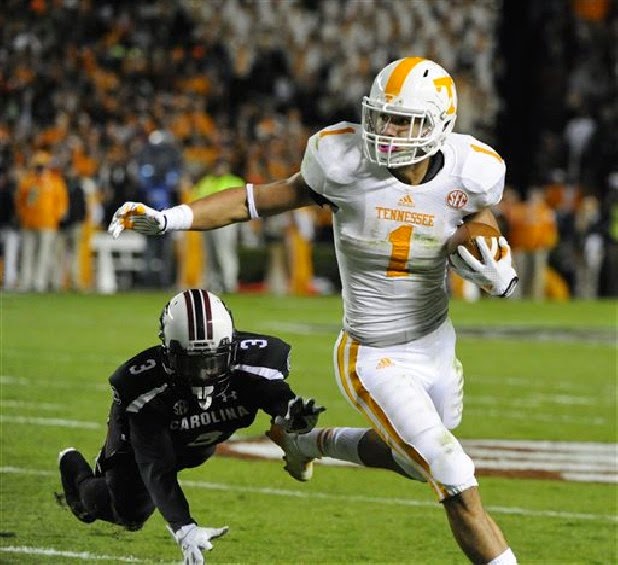 |
| Dad in his 30s talks with his father, Milum, and Brother Robert |
When
Tennessee came from behind last Saturday to beat South Carolina, I had a
fleeting urge to call my father, who died 10 years ago, just to talk about the
game. Dad and I never really had
ordinary conversations. We never talked just to talk. Not that I can remember,
anyway. He just wasn't wired that way. Stoic
mountain roots and all that. Displays of affection were rare, too. In the
half-century we knew each other, I can count on one hand the times we embraced, and they all seemed awkward and forced.
When Dad and I had conversations there was always a buffer, an insulating
wall. We had to have something to wrap the
dialogue around - usually some inanity like the weather, the best road
to take somewhere, or food. If I had him
back for just one day, I would pry out of him stories about his
youth just to fill in some blanks.
For example, I know that in 1939, when he was 19, he left Tennessee for New York City where he worked as a bus boy at the Brass Rail Restaurant in Times
Square. I don’t know how I know this,
but I do. It had something to do with the 1939 World’s Fair, but I don’t know
what. There is more to that story, but it
was buried with him.
 |
| Talented running back Jalen Hurd scores |
He attended East Tennessee State University (Teacher’s College back then)
for two years but dropped out. What happened? Who knows?
When I was 12, he went through some kind of emotional crisis. He
lay in bed, reading. My mother cried a lot. When he finally did emerge,
he sat for hours at a time just staring out the picture window in the living room. It was depression, I suppose. One day he just snapped out of it. He shaved, put on his best suit, and got a job selling Edsels. I never saw him spin out like that again, and I never knew
what caused it.
But the one thing Dad and I could always talk about was University of
Tennessee football. I have an early
memory of my father listening to a Vols game on his car radio. He sat in front seat of the parked car – a black 1950 ford sedan
– with the door open and one leg dangling out, staring at the dashboard and listening intently. He was 31, well muscled with coal-black hair. I had to be five years old. I know this because we lived in Rogersville,
Tenessee at the time. That would put the year at 1951, which was an exceptional year for UT. The coach back then was the
legendary Robert Neyland – the one for whom the stadium is named and the coach who led the Big Orange to an undefeated season and a national championship that year. It was a feat that would not be repeated
until 1998, under Philip Fulmer.
When Dad saw me, he lifted me up and sat me down beside him on the front
seat. It was a new car; I still remember
that distinctive new-car smell. Although I didn't know what it was about, I remember the cadence of the sports announcer’s voice – slow at first as the players lined up and then suddenly frenetic and excited as the ball
carrier went into motion. Although I was only five, I somehow knew, judging from the urgent sounds coming from the radio and my father's reaction to them, that this was something important. It was only natural that as I grew up I would
become infected by the same orange virus.
We didn’t have a television until
1959. It was the “Devil’s eyeball,” my
father said. When we finally did have one, it was because Dad wanted to watch
Tennessee play their arch-rival Alabama on the tube.
In the early 1960s, he took me to a game at Neyland Stadium. It was utter excitement, even though the Vols
lost to Ole Miss by three points. The most emotion I think I ever saw my father display
was when the boys in the pumpkin-colored uniforms scored a touchdown.
As the years passed, I called Dad several times, especially during the glory days of
Peyton Manning. We spoke after every game during the magical 1998 season when the Vols went undefeated
and beat the Florida State Seminoles for the national championship. The Volunteers
began to struggle after that. There
wasn't much to talk about when they lost.
Dad went downhill too after 2000, and died of a stroke in 2004.
Last Saturday, when the Gamecocks scored with four minutes left on the
clock, putting Tennessee two touchdowns behind, I just turned the game off. I didn't
want to see them lose again. It’s only a
game, I told myself. Just before I went
to bed, however, I decided to check ESPN on the computer just to see what their
margin of defeat had been. I couldn't
believe what I saw! “Are you kidding
me??!!!” I said out loud. They had won the game by three points in
overtime! Joshua Dobbs, their new mobile
quarterback, had somehow put them in the end zone twice in two minutes and tied
the game with 11 seconds left. Their
field goal kicker put one through the uprights to put them ahead by three in
overtime. Then the Tennessee defense pushed the Gamecocks back out of field
goal range and the kicker’s attempt was a duck that wobbled short. What an unbelievable comeback! That’s when
I thought of Dad. He wouldn't have
abandoned hope like I did. He would have stayed
with them until the bitter end. He also
would have called me, if I didn’t call him first, to rejoice over one of the
few things we had in common.